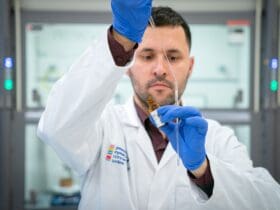With temperatures in Wales reaching 23 degrees this week, spring has well and truly sprung, and we can start looking forward to spending more time outdoors and enjoying the sunshine.
We all know the dangers of exposing yourself to too much sun, and it’s vital that you regularly apply a high factor sun cream (factor 25 or above) and try to stay in the shade between the peak hours of 12-3pm as this is when the sun as at its strongest.
However, the sun itself can be extremely beneficial for our health, particularly because provides a great and natural source of Vitamin D, which forms under the skin as a reaction to sunlight and is one of a group of key vitamins needed in order to keep the body healthy and functioning properly.
It doesn’t actually take much exposure to direct sunlight to achieve this vital vitamin boost either – on average, just 15-20 minutes in the sun will provide enough vitamin D for the day, and it only needs to touch the face, hands and feet.
Darker skin actually requires more sunlight than lighter skin in order to provide the right level of vitamin D while redheads require far less exposure to sunlight for a good amount of vitamin D to form.
Vitamin D deficiency, which can cause extreme tiredness, muscle and bone pain and general weakness, is surprisingly common in the UK. In children and babies symptoms include poor growth, bowed legs, increased incidence of infections and tooth decay. Young children, pregnant women, breast-fed babies, and people over 65 are most at risk at developing the condition.
In children particularly, this has a lot to do with the decline in the amount of time spent outside (exposed to sunlight) playing, preferring instead to watch television or play computer games!
Scientists have in fact discovered that vitamin D has an important job to do for a whole range of bodily functions, withrecent research linking low levels of this particular vitamin to a number of conditions including diabetes, osteoporosis, high blood pressure and heart disease. It has been suggested that it may also help to reduce the risk of developing multiple sclerosis as well as the severity of asthma symptoms.
The so called ‘sunshine vitamin’ also controls the absorption of calcium into the body – essential for bone heath and necessary for blood clotting. It has furthermore been linked to lowering the risk of developing cancer and has a key role in helping to maintain healthy brain function in later in life.
While all this is a great excuse to take a nice walk in the sunshine, it’s not just the sun that can help you to get your dose – vitamin D is also found in certain foods and good examples would be fortified breakfast cereals, oily fish such as mackerel and sardines, eggs, cheese and liver.
Groups that are prone to vitamin D deficiency may also benefit from taking vitamin D supplements.
So, make sure you get out and enjoy the sunshine safely…while it lasts!








Leave a Reply
View Comments